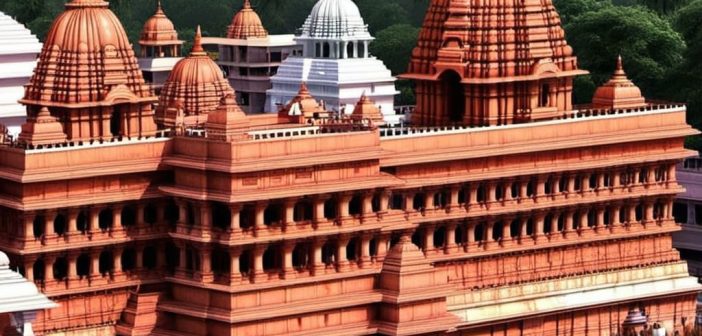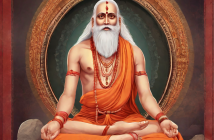Delve into the intricate interplay of religion and politics at the Ayodhya Ram Mandir Pran Pratishtha. This article unravels the reasons behind the Shankaracharyas‘ controversial rejection of the ceremony, their impact on public opinion, and the broader implications for India’s religious and political landscape.
The four main Shankacharyas in India, heads of the four cardinal monastic Peeths, declined invitations to the Ayodhya Ram Mandir inauguration ceremony on January 22nd, 2024. While their decision resonated across the Hindu religious landscape, their individual motivations and concerns differed
The Ayodhya Ram Mandir Pran Pratishtha ceremony is significant in India’s cultural and religious landscape. This event, deeply rooted in Hindu tradition, marks the consecration of the deity in the temple, symbolizing the infusion of life into the idol. In the context of the Ayodhya Ram Mandir, this ceremony gained national attention not only for its religious importance but also due to the involvement of prominent Hindu religious figures, particularly the four Shankaracharyas.
About Four Shankaracharyas
- Swami Avimukteshwaranand Saraswati: The Shankaracharya of Jyotish Peeth in Badrinath and a vocal critic of the BJP government, Swami Avimukteshwaranand was one of the first to announce his absence. He cited the violation of Hindu scriptures as his primary reason, emphasizing that installing idols before the temple’s completion went against traditional practices. He also expressed discomfort with the event’s politicization and potential for social disharmony.
- Swami Nishchalanand Saraswati: The Shankaracharya of Puri Govardhan Peeth in Odisha, Swami Nishchalanand is known for emphasising interfaith dialogue and social welfare. He echoed Swami Avimukteshwaranand’s concerns about the timing of the idol installation and the ceremony’s potential for political exploitation. He emphasized the need for unity and reconciliation, highlighting the importance of respecting the sentiments of all communities.
- Swami Bharati Teerth Mahaswamiji: The Shankaracharya of Sringeri Sharada Peeth in Karnataka, Swami Bharati Teerth, although initially considered attending, ultimately decided against it. While the reasons haven’t been explicitly stated, reports suggest he shared concerns about the ceremony’s timing and potential for political interference. His absence is seen as significant, given Sringeri Peeth’s historical proximity to the Ayodhya issue.
- Swami Swaroopanand Saraswati: The Shankaracharya of Dwarka Sharada Peeth in Gujarat, Swami Swaroopanand, hasn’t officially confirmed his attendance or absence. However, his past statements suggest he might share concerns similar to the other three Shankaracharyas regarding the ceremony’s potential for divisiveness and politicization.
The Shankaracharyas, revered in Hinduism, are spiritual leaders with immense influence. Each represents one of the four cardinal peethas (monastic seats) established by Adi Shankara, an 8th-century Indian philosopher and theologian. These include the seats of Puri, Dwarka, Sringeri, and Jyotirmath. The Shankaracharyas are highly respected for their knowledge and interpretation of Hindu scriptures, and their roles involve guiding the spiritual journey of their followers and influencing Hindu religious practices.
However, the Ayodhya Ram Mandir Pran Pratishtha ceremony became a point of contention involving these religious leaders. Due to their individual interpretations of theology, political views, or social beliefs, each Shankaracharya chose to reject invitations to the ceremony. This decision sparked widespread discussion and controversy, highlighting India’s complex interplay between religion and politics.
The reasons for their rejection vary. Some cited theological disagreements over the ceremony’s alignment with traditional Hindu practices. Others expressed political reservations, perhaps wary of aligning too closely with certain political entities or ideologies. These decisions by the Shankaracharyas have significantly influenced public opinion, leading to debates and discussions that transcend religious circles, spilling into the broader political and social discourse.
The reaction to their refusal to participate has been varied. Some communities and religious leaders support their stance, seeing it as a stand for religious purity and independence from political influence. In contrast, other groups criticize their decision, viewing it as a missed opportunity to promote Hindu unity or as an unnecessary politicization of a religious event.
This incident reflects the intricate dynamics of religion and politics in India. It showcases how religious leaders can influence religious practices, political narratives, and social conversations through their actions and decisions. The Shankaracharyas, by their refusal to participate, have underscored the delicate balance between religious authority and political involvement.
Looking ahead, the implications of this controversy are multifaceted. It could reshape the relationship between religious leaders and political entities, perhaps leading to a more cautious engagement or a reassertion of religious autonomy. The incident might also impact communal harmony, either fostering a more critical view of religious-political intersections or encouraging a deeper introspection within religious communities about their role in societal discourse.
The decision of all four Shankaracharyas to decline the invitation was unexpected by many. While some see it as a political stand against the BJP, others view it as a moral stance reflecting their concern for upholding Hindu Dharma and maintaining social harmony. It’s crucial to note that their decision, although a significant development, doesn’t represent the totality of Hindu opinion on the matter.
Ultimately, the impact of the Shankaracharyas’ absence on the Ayodhya Ram Mandir and the upcoming elections remains to be seen. However, it undoubtedly adds a layer of complexity to the already multifaceted narrative surrounding this historic event. Their decision highlights the importance of critical engagement with religious practices and traditions, urging a focus on spiritual values and social cohesion beyond the political prism.
In the long term, this controversy could influence religious practices and ceremonies in India. It might lead to reevaluating how these ceremonies are conducted, who participates in them, and how they intersect with the broader socio-political landscape. The decisions of the Shankaracharyas and the ensuing reactions highlight the evolving nature of religion in the face of political and social change. Therefore, the Ayodhya Ram Mandir Pran Pratishtha is not just a religious event but a moment that encapsulates the ongoing dialogue between tradition, modernity, religion, and politics in India.




